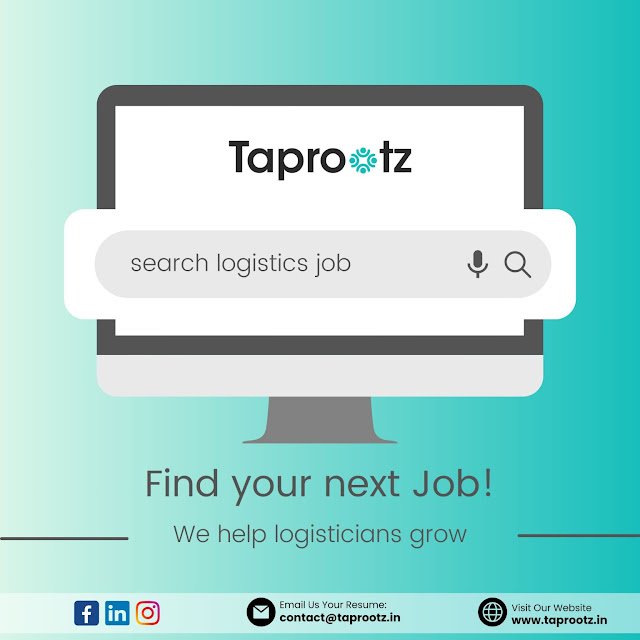Unlocking the Potential: Unveiling the Scope and Limitless Opportunities of Logistics Jobs in India
1. Introduction
Logistics is a critical aspect of any economy, facilitating the movement of goods and resources from one place to another. In India, the logistics industry plays a vital role in supporting various sectors such as manufacturing, retail, e-commerce, and agriculture. With the rapid growth of the Indian economy, there has been an increasing demand for skilled professionals in the logistics sector. This blog explores the scope and limitless opportunities available in logistics jobs in India, shedding light on the potential for career growth and development in this dynamic industry.
2. Exploring the Vast Potential of Logistics Jobs in India
The logistics industry in India offers a plethora of opportunities for individuals seeking a promising and fulfilling career. As the Indian economy continues to grow at a rapid pace, the demand for logistics services has soared, creating a high demand for skilled professionals in this sector. From transportation and warehousing to supply chain management, there are various roles and positions available that cater to a diverse range of skills and interests.
1. Supply chain management:
Supply chain management is a critical aspect of the logistics industry. It involves the coordination and management of all activities related to the procurement, production, and distribution of goods. Professionals in supply chain management play a key role in optimizing the flow of goods and ensuring timely delivery to customers. This field requires individuals with strong analytical and problem-solving skills as well as the ability to effectively manage and communicate with different stakeholders.
2. Transportation and logistics:
The transportation sector is a vital component of the logistics industry. With India being a vast country, efficient transportation is essential for the smooth movement of goods across different regions. From trucking and shipping to air and rail transportation, there are various opportunities for individuals interested in this field. Jobs in transportation and logistics involve managing routes, coordinating shipments, and ensuring the safe and timely delivery of goods.
3. Warehousing and inventory management:
Warehousing and inventory management play a crucial role in the logistics process. Professionals in this field are responsible for overseeing the storage, handling, and distribution of goods within warehouses. They are also responsible for organizing inventory, maintaining accurate records, and optimizing storage space. Strong organizational and problem-solving skills are essential for individuals in this role.
4. E-commerce logistics:
With the rise of e-commerce in India, there has been a significant increase in the demand for professionals in e-commerce logistics. E-commerce logistics involves the management of the entire logistics process for online businesses, including order fulfillment, inventory management, and last-mile delivery. This field offers exciting opportunities for individuals interested in the intersection of technology and logistics.
3. The Evolving Landscape of the Logistics Industry
As the logistics industry in India continues to expand and adapt to the changing business landscape, technology plays a crucial role in driving efficiency and innovation. From optimizing supply chain operations to enhancing customer experience, technology has revolutionized the way logistics companies operate. Here are some key aspects where technology has made a significant impact:
1. Warehouse Management Systems (WMS):
Warehouse Management Systems (WMS) have become an essential tool in effectively managing inventory and streamlining warehouse operations. These systems use real-time data to automate tasks such as inventory tracking, order processing, and stock replenishment. By utilizing WMS, logistics companies are able to improve accuracy, eliminate errors, and optimize inventory management. Additionally, WMS provides visibility into the movement of goods, enabling seamless coordination between different stakeholders.
2. Transportation Management Systems (TMS):
Transportation Management Systems (TMS) have transformed the way logistics companies handle transportation operations. TMS software optimizes routes, consolidates shipments, and provides real-time tracking and visibility into the movement of goods. Through TMS, logistics companies can reduce transportation costs, enhance efficiency, and improve customer service by providing accurate delivery estimates. TMS also enables automated freight invoice audit and payment, eliminating manual processes and saving time and resources.
3. Internet of Things (IoT):
The Internet of Things (IoT) has emerged as a game-changer in the logistics industry. IoT devices such as sensors and RFID tags are used to gather real-time data on the location, condition, and movement of goods. This data enables logistics companies to track and monitor shipments, ensuring compliance with temperature, humidity, and other environmental conditions. IoT devices can also detect and address potential issues in the supply chain, such as delays or deviations, proactively minimizing disruptions. Overall, IoT improves operational efficiency, reduces costs, and enhances the security and safety of goods.
4. Artificial Intelligence (AI) and Machine Learning (ML):
Artificial Intelligence (AI) and Machine Learning (ML) are empowering logistics companies to make data-driven decisions and optimize various aspects of the supply chain. AI and ML algorithms analyze vast amounts of data to identify patterns, predict demand, optimize inventory levels, and optimize transportation routes. These technologies enable businesses to automate repetitive tasks, improve forecasting accuracy, and enhance overall operational efficiency. AI-powered chatbots and virtual assistants also provide customer support, improving customer experience and reducing response times.
4. The Diverse Opportunities within the Logistics Sector
The logistics sector in India offers a wide range of job opportunities across various domains. As the industry continues to grow and evolve, there is an increasing demand for skilled professionals who can contribute to the efficient and effective management of the supply chain. Here are some of the diverse career opportunities within the logistics sector:
1. Supply Chain Management: Supply chain management professionals play a vital role in overseeing the entire flow of goods and services, from the procurement of raw materials to the delivery of finished products. They are responsible for planning, coordinating, and controlling the movement of goods, ensuring timely delivery while optimizing costs and maintaining quality standards. Careers in supply chain management can include roles such as supply chain analyst, logistics coordinator, inventory manager, and demand planner.
2. Warehouse and Distribution Management: Warehouse and distribution management professionals are responsible for the efficient operation of warehouses and distribution centers. They oversee the storage, inventory management, and distribution of goods, ensuring timely and accurate order fulfillment. Careers in warehouse and distribution management can include roles such as warehouse supervisor, distribution manager, inventory controller, and fulfillment specialist.
3. Transportation and Logistics: Transportation and logistics professionals are involved in the planning, coordination, and execution of transportation activities within the supply chain. They are responsible for selecting the most efficient transportation modes, managing carriers and contracts, and ensuring timely and cost-effective delivery of goods. Careers in transportation and logistics can include roles such as logistics manager, transportation coordinator, freight forwarder, and customs broker.
5. Skills and Qualifications Required for a Career in Logistics
The logistics sector in India offers a plethora of job opportunities across various domains. To excel in this dynamic industry, individuals need to possess a specific set of skills and qualifications. Here are some of the essential skills and qualifications required for a successful career in logistics:
1. Knowledge of supply chain management: A deep understanding of supply chain management is crucial for professionals working in the logistics sector. This includes knowledge of inventory management, transportation planning, demand forecasting, and warehouse operations. Professionals with expertise in supply chain management can effectively optimize processes, minimize costs, and ensure smooth operations.
2. Analytical and problem-solving skills: The logistics industry involves handling complex data and making critical decisions. Therefore, individuals need to possess strong analytical and problem-solving skills to identify inefficiencies, find solutions, and make informed decisions that can enhance overall operational efficiency. Analytical skills also play a vital role in forecasting demand, analyzing market trends, and optimizing routes.
3. Communication and interpersonal skills: Effective communication is essential in the logistics sector as professionals interact with various stakeholders, including suppliers, vendors, customers, and team members. Strong communication and interpersonal skills enable professionals to effectively convey information, negotiate contracts, resolve conflicts, and build productive relationships. Good listening skills are also fundamental to understand the needs and expectations of clients and colleagues.
4. Technological proficiency: With the increasing integration of technology in logistics operations, professionals need to be technologically proficient. This includes knowledge of transportation management systems, warehouse management systems, data analytics tools, and other software applications used in the industry. Proficiency in technology allows individuals to leverage digital solutions, automate processes, and enhance productivity.
5. Time management and organizational skills: The logistics sector often involves handling multiple tasks simultaneously and meeting strict deadlines. Therefore, individuals need to possess excellent time management and organizational skills to prioritize tasks, allocate resources efficiently, and ensure timely completion of projects. Strong organizational skills also contribute to maintaining accurate records, managing inventories, and optimizing space utilization.
6. Continuous learning and adaptability: The logistics industry is constantly evolving, driven by technological advancements, changing customer demands, and market trends. Therefore, individuals need to have a growth mindset and a willingness to continuously learn and adapt to new advancements and industry standards. Keeping up with the latest trends and acquiring relevant certifications or qualifications can greatly enhance career prospects in the logistics sector.
7. Degree or diploma in logistics or related field: While not always mandatory, a degree or diploma in logistics or a related field can significantly boost career opportunities in the industry. These programs provide individuals with comprehensive knowledge of logistics principles, supply chain management, transportation management, and other core aspects of the industry. Additionally, certifications such as Certified Supply Chain Professional (CSCP) or Certified Professional in Logistics and Supply Chain Management (CPLSCM) can also enhance professional credibility and open doors to advanced roles.
6. Conclusion: Embracing the Limitless Potential of Logistics Jobs in India
The logistics job market in India offers boundless opportunities for individuals seeking a successful career in this dynamic industry. However, it is crucial to recognize and overcome the challenges that come alongside these prospects in order to maximize your chances of success.
To navigate the competitive landscape, it is imperative to showcase your unique skills, experiences, and qualifications. Highlight any specialized training or certifications you have obtained in logistics or related fields, as these can give you a competitive edge over other candidates. Additionally, staying updated with the latest industry trends and advancements will demonstrate your commitment to professional growth and make you a desirable candidate for employers.
In a rapidly evolving technological era, professionals in the logistics field must embrace advancements and keep pace with the latest tools and systems. Familiarize yourself with transportation management systems, warehouse management systems, and data analytics tools that are commonly used in the logistics sector. Being technologically proficient will not only make you an asset to any organization, but also increase your marketability in the job market.
Supply chain disruptions, such as natural disasters or economic crises, pose significant challenges in the logistics industry. Employers value professionals who can effectively manage and mitigate supply chain risks. Highlight your ability to develop backup plans, implement risk management strategies, and adapt quickly to unforeseen circumstances. Being proactive and demonstrating problem-solving skills will make you an invaluable asset to organizations operating in the logistics sector.
With changing customer demands driven by advancements in e-commerce and globalization, it is essential for logistics professionals to understand and cater to these evolving needs. Stay updated on the latest market trends, customer preferences, and delivery models to deliver exceptional customer experiences. Adaptability and flexibility will be crucial in meeting customer expectations and ensuring long-term success.
As logistics professionals often interact with various stakeholders across different functions of an organization, building cross-functional skills is imperative. This enables effective collaboration with different teams and ensures clear communication and alignment of logistics activities with overall organizational goals. Seek opportunities to work on projects involving cross-functional collaboration, hone your communication and interpersonal skills, and develop a holistic understanding of how logistics integrates with other business functions.
By acknowledging and addressing these challenges, you can tap into the vast potential available in the logistics job market in India. Demonstrate your expertise, embrace technology, and maintain adaptability to stay ahead of the competition. With a strategic approach and a commitment to continuous learning, you can position yourself for a rewarding and successful career in this thriving industry. Embrace the limitless potential of logistics jobs in India and unlock a world of opportunities.


.jpg)

Comments
Post a Comment